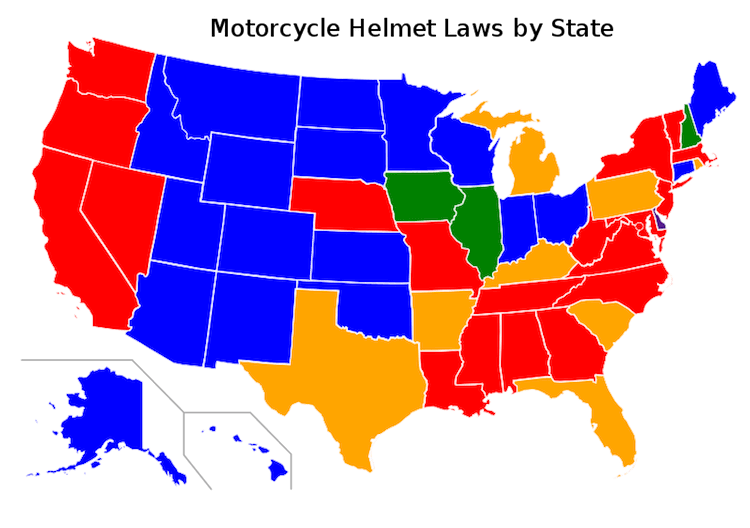
Currently, Illinois is one of the few remaining states that has yet to implement a motorcycle helmet law. For years, the lack of an Illinois motorcycle helmet law has been a point of contention among liberty-minded folks and motorcycle safety advocacy organizations in the state.
At Rosenfeld Injury Lawyers, LLC, our personal injury attorneys represent injured victims hurt in motorcycle accidents. If you suffered at the hands of another’s negligence, contact our Chicago motorcycle accident lawyers today at (888) 424-5757 (toll-free phone number) or use the contact form to schedule a free consultation.
As you can see from this map showing motorcycle helmet laws by state, the lack of a mandatory helmet law in Illinois makes this state stand out from most others that enforce motorcycle helmet safety laws.
However, to see one effect of motorcycle helmet laws, it’s useful to look at another Midwest state. Michigan relaxed its motorcycle helmet laws in 2012, and the state has seen a drastic increase in healthcare costs associated with injured riders as a result.
For example, for more than 40 years, Michigan required that all riders wear a helmet, and before the mandatory helmet law was amended, the average claim for an injured biker was about $5,410. After the amended law went into force, the average claim for injured riders rose to about $7,257. Thus, insurance companies stand to benefit from weak or nonexistent motorcycle helmet injury laws.

Illinois’ History of Motorcycle Helmet Laws
The Illinois legislature adopted a motorcycle helmet law in 1968. However, the helmet law was later overturned by the Illinois Supreme Court [1] as an “unconstitutional abuse of police power” in the case of People v. Fries. The issue was again raised in 2009 in the Illinois Senate.
Motorcyclists would have been required to wear a helmet with chin straps under this law, but the measure was ultimately rejected. Today, Illinois continues to remain without a motorcycle helmet law in force.
What Are Universal Motorcycle Helmet Laws?
Universal motorcycle helmet laws are regulations that necessitate the wearing of helmets while riding a motorcycle. They are effective at reducing injuries and deaths due to motorcycle accidents. Moreover, these laws are effective for all ages.
They should not only be implemented on motorcycle operators but also the passengers. Repealing these motorcycle helmet laws decreases the use of helmets and increases deaths due to motorcycle accidents.
Motorcycle crashes only account for 3% of all registered vehicles. But 15% of all fatalities in motor vehicle accidents were due to motorcycles back in 2013. According to the U.S. Government Accountability Office [2], the measurable cost of these crashes was $16 billion back in 2010.
With universal motorcycle helmet laws, these costs and deaths can be lowered.
Benefits of Motorcycle Helmet Laws
Research studies from the Centers for Disease Control and Prevention (CDC) have indicated that motorcycle helmet laws have a powerful impact on preventing injuries for riders on the road. The CDC has found that states with motorcycle helmet laws have a usage rate that is almost 100 percent.
Motorcycle drivers are at a decreased risk of suffering from head injuries when they use helmets, and the CDC has found that states with motorcycle helmet laws tend to enjoy greater healthcare savings as a result. For instance, California could save more than $394 million in healthcare costs due to its universal motorcycle helmet law, which applies to all riders on the road.
Meanwhile, New Mexico has a partial motorcycle helmet law, and it enjoyed a savings of just $2.6 million in healthcare costs after its enactment.
States with universal motorcycle helmet laws also have a much lower death rate for drivers involved in accidents. For example, only 12 percent of motorcycle operators who died in crashes were not wearing helmets at the time of the accident in states with these helmet laws.
According to the Insurance Institute of Highway Safety, more than 64 percent of drivers involved in crashes died in states that do not have universal helmet laws. Nineteen states currently have a universal helmet law where all motorcycle drivers on the road must wear a helmet regardless of their age.
Motorcycle Helmet Laws by State
Alabama – Any motorcyclist who drives or rides in Alabama must wear protective headgear designed specifically for motorbike riders and passengers. The helmet must have a hard exterior shell of non-shatterable material that protects against impact and penetration.
In Alabama, passengers cannot ride on a motorcycle unless the vehicle has been equipped and designed to have foot pegs that allow the sitting of more than one person. In addition, Alabama has lane-sharing and passing laws. These laws state:
- A motorcyclist cannot spit lanes or ride between lanes or rows of vehicles.
- Motorcyclists can ride side by side in the same lane. However, there should not be more than two motorcyclists in one lane.
- If a vehicle is being overtaken, a motorcyclist cannot pass the vehicle in the same lane.
Alabama motorcycle helmet laws also require the helmet to have a firmly secured cradle. The cradle on the head should be shock absorbent and be designed to separate the outer shell and the head.
Alaska – In Alaska, persons 18 years old or older “may not” be compelled to wear a helmet while driving a motorcycle if they have the proper license. On the other hand, Motorcycle drivers must wear eye protection unless their bike has a windscreen or windshield.
The Public Safety Commissioner in Alaska oversees the law. Because these rules and specifications are subject to change, it’s advisable to verify with the Commissioner before driving or riding a passenger on a motorcycle in Alaska.
Arizona – Motorcycle riders 21 years of age or older are not required to wear a helmet in Arizona. Those under 21 must wear a helmet if they drive a motorcycle on a public road, highway, city street, or county road.
Motorcycle riders in Arizona must also wear a transparent face shield, protective glasses, or goggles. These are not important if the bike has a protective windshield.
Arkansas – Any person driving a motorcycle on an Arkansas roadway should come prepared with eye protection and protective gear that can withstand a collision with a vehicle. Head protection is optional, but it’s recommended for riders in Arkansas 21 years old or younger.
California – In California, all motorcycle drivers and passengers must wear motorcycle helmets whenever they ride on the road, even if it’s only for one mile (1.6 km). Helmets also must be worn by motorcyclists riding as passengers on other vehicles, including motorcycle and sidecar passengers.
If you live in California, your helmet must meet the safety standards of the U.S. Department of Transportation. In addition, the helmet must fit on your head securely without moving much vertically or laterally.
Colorado – Colorado does not have a motorcycle helmet law, but it does advise all riders to wear safety helmets whenever they ride on the road. Distracted driving is illegal in Colorado, and any distraction can contribute to an accident.
Connecticut – Every rider or passenger under 18 years old should wear a safety helmet when riding or operating a motorcycle in Connecticut. The DOT must approve these helmets.
Delaware – Drivers and passengers on motorcycles, mopeds, motorized bicycles, or similar vehicles should always wear protective headgear while driving or riding on public roads in Delaware.
If you are under the age of 19 in Delaware, you need to wear a safety helmet. Anyone over this age must wear eyeglasses and a helmet in their possession when they are on the bike.
Florida – No one under 21 years old may drive a motorcycle or wear a helmet in Florida unless they’re on their parent’s property. These motorcycle helmet laws [3] are enforced under the “Florida Motorcycle Helmet Law.”
All motorcyclists in Florida must wear shatter-resistant eyeglasses protection irrespective of their age. However, if you’re riding in an enclosed sidecar, you don’t have to wear eye goggles or a helmet.
Georgia – Drivers and passengers of motorcycles, mopeds, or motorized bicycles should always wear motorcycle helmets that the DOT approves. Riders must follow these rules even if they’re coming from another state.
Hawaii – Riding a motorcycle without wearing safety gear, including a DOT-approved helmet, is prohibited under the state’s “Motorcycle Helmet Use Act.” [4]
If you’re over the age of 18, you don’t have to wear a helmet in the state of Hawaii. However, you still must wear goggles, a face shield, or safety glasses if your motorcycle does not have a windshield.
Idaho – All bikers and motorcycle passengers must wear safety helmets in Idaho. The motorcycle helmet law does not apply to riders who only operate on private property or with instructional permits. Helmets must be a DOT-approved design.
Illinois – Motorcycle drivers in Illinois who are 18 years old or older have the option to wear motorcycle helmets that meet U.S. Department of Transportation safety standards while operating their bikes on public roads and highways. There is a mandatory helmet law for children. Riders who do not wear a helmet can face fines, suspensions, and points on their license.
Indiana – It’s up to drivers and passengers in Indiana to decide whether they will wear a helmet when riding motorcycles, mopeds, or scooters. Drivers who don’t wear approved motorcycle helmets can face fines and points on their licenses.
Iowa – Motorists under 18 years old must wear DOT-approved helmets while operating or riding a motorcycle in Iowa. Drivers who don’t follow this requirement can face fines, suspensions, and points on their licenses.
Kansas – Riders in Kansas must wear safety helmets under 18 years old or for instructional permits only. Operators will also need to wear a helmet if they come from another state with no motorcycle helmet law or if their license is from a U.S. territory or foreign country.
Kentucky – Operators of motorcycles, scooters, and mopeds in Kentucky are not required to wear safety helmets if they have at least $10,000 worth of medical insurance coverage for injuries that might happen while driving the vehicle on public roads.
If you’re under the age of 21 in Kentucky, you must wear a helmet. In addition, if you have had your permit to ride a motorcycle for less than a year, you need to wear a helmet. Also, you need to wear eye protection that the Secretary of Transportation’s cabinet has approved.
Louisiana – Motorcycle riders who are 21 years old or younger must wear safety helmets that the Department of Transportation. Operators who do not carry proof of having completed a motorcycle rider safety course can face fines and suspensions for failing to comply with this requirement.
Maine – Motorcycle operators in Maine should always wear DOT-approved helmets, even if they’re coming from another state. Maine’s motorcycle helmet law applies to all riders, no matter their age.
Maryland – Motorcyclists in Maryland must wear safety helmets that meet U.S Department of Transportation safety standards. Riders who don’t wear DOT-approved helmets can be subject to traffic tickets and insurance surcharges.
The helmets you wear must be following the standards of the Administrator of Transportation in Maryland. The regulatory authority releases a list of helmets and other protective gear that they approve.
Massachusetts – It’s the motorcycle helmet law [5] for bikers 21 years old and younger to wear safety helmets that meet the U.S. Department of Transportation’s safety standards while operating their bikes on public roads or highways. Riders who don’t follow this motorcycle helmet law can be subject to fines, suspensions, and other penalties.
Michigan – Riders in Michigan should always wear DOT-approved safety helmets while operating motorcycles on public roadways. The regulations apply to all motorcycle drivers, regardless of age, whether they are state residents or visitors.
You are only exempt from wearing a helmet under the following conditions:
- If you have a motorcycle endorsement on your license for over two years or have completed an approved motorcycle operator training and safety course.
- You have an insurance policy that provides accidental coverage of $20,000 or more.
Minnesota – Operators 21 years old and under in Minnesota must wear safety helmets when riding motorcycles on public roadways. Riders who violate this motorcycle helmet law can be ticketed for failing to follow DOT regulations.
If you are participating in a parade that has been authorized officially or riding in an enclosed cab, you are exempt from these universal helmet laws.
Mississippi – Motorcycle riders in Mississippi should wear a helmet if they’re younger than 21 years old. Riders who do not comply with this requirement can be fined and have their license suspended for multiple violations.
Missouri – In Missouri, motorcycle riders of any age must wear helmets that meet the state’s safety standards while operating on public roads or highways. The regulations apply to all riders, no matter if they are state residents or visitors.
Montana – Motorcycle operators in Montana must wear helmets that meet the DOT’s safety standards if they’re younger than 18 years old. Riders who don’t follow these state universal helmet laws can face fines and suspensions of their license for multiple violations.
Nebraska – Motorcyclists 21 years old or younger must wear safety helmets that meet the DOT’s safety standards when operating their bikes on public roadways. Operators who don’t follow these regulations can be issued a $25 fine and have points added to their licenses.
Nevada – All motorcycle operators are required to wear helmets that always meet the Federal government Department of Transportation’s safety standards while riding on Nevada roads and highways (those coming from another state or foreign country don’t have to follow this rule).
New Hampshire – Motorcycle riders in New Hampshire only need to wear safety helmets if they’re younger than 18 years old. Intoxicated motorcycle operators are also required to wear helmets. Riders who do not follow these regulations can receive traffic infractions.
New Jersey – Motorcycle operators in New Jersey must wear helmets that meet the DOT’s safety standards. The regulations apply no matter where they’re riding their bikes. If they don’t follow them, they can receive traffic tickets and insurance surcharges.
New Mexico – Motorcyclists 21 years old or younger must wear helmets that meet the DOT’s safety standards when riding on New Mexico roads and highways. However, New Mexico law [6] states that operators won’t have to follow this requirement if they come from a foreign country or another state.
New York – In New York, riders must wear helmets that always comply with the DOT’s safety standards (even those who are riding out of state). Violators can receive multiple traffic tickets and face additional insurance surcharges, even those on a motorized bicycle.
North Carolina – Motorcycle operators must wear helmets that meet the DOT’s safety standards when riding on public roadways. Riders who don’t follow this requirement can be subject to fines, suspensions, and other penalties.
North Dakota – Motorcyclists must wear helmets that meet the DOT’s safety standards if they are younger than 18 years old. Riders who violate this state motorcycle helmet law can face fines, driver’s license suspensions, and other penalties.
Ohio – Motorcycle operators in Ohio must wear helmets [7] that meet the DOT’s safety standards while riding on public roadways (those coming from another country or state don’t have to follow this rule). Riders who don’t comply with these regulations can be fined and have points added to their licenses.
Oklahoma – In Oklahoma, all motorcycle operators must wear helmets that meet the Department of Transportation’s safety requirements while riding on public roadways. If they don’t, they face fines and license suspensions in addition to other penalties.
Oregon – Motorcycle operators in Oregon are not required to wear helmets if they’re over the age of 18 years old (those 21 years old or younger must comply with this regulation). Riders who don’t follow these state laws can be fined and have their licenses suspended for multiple violations.
Pennsylvania – While riding motorcycles on public roadways, all motorcycle operators must wear helmets that meet federal DOT standards. Riders who don’t follow these rules face fines and the suspension of their licenses for multiple offenses.
Rhode Island – In Rhode Island, all motorcycle operators younger than 21 must wear helmets that adhere to Department of Transportation safety standards. Motorcycle operators who don’t follow these regulations can face fines and have their licenses suspended for multiple violations.
South Carolina – All motorcycle operators must wear helmets that meet the DOT’s safety standards when riding on public roadways. They will also be required to carry minimum levels of medical insurance coverage, which is determined by the state’s Office of Insurance Services.
South Dakota – Motorcycle operators in South Dakota are required to wear helmets [8] that meet the Federal DOT’s safety standards if they’re younger than 18 years old. According to South Dakota law, riders who violate these rules can face fines, driver’s license suspensions, and other penalties.
Tennessee – All motorcycle operators younger than 21 must wear helmets that follow Department of Transportation safety standards while riding on public roadways. Violators can receive fines and have their licenses suspended for multiple offenses.
Texas – In Texas, all motorcycle operators must wear helmets that meet DOT safety standards if they’re younger than 21 years old (if older, they don’t have to follow this requirement). Riders who violate these state laws will be fined and have their licenses suspended for multiple violations.
Utah – Motorcycle operators in Utah must wear helmets that meet DOT safety standards if they’re younger than 18 years old (those riding with out-of-state licenses don’t have to follow this rule). Riders who violate these rules can be fined, lose points on their licenses, and even face the suspension of their licenses.
Vermont – All motorcycle operators younger than 18 must wear helmets that meet Department of Transportation standards when riding on public roads. Violators can be fined and have their licenses suspended for multiple offenses.
Virginia – In Virginia, all motorcycle operators must wear approved helmets while riding on public roadways (those coming from out of state don’t have to follow this rule). Riders who violate these regulations will be fined and could also lose their licenses for multiple violations.
Washington – Motorcycle operators in Washington State must wear helmets that meet DOT safety standards if they’re younger than 18 years old (those with out-of-state licenses don’t need to comply with this law). Riders who violate these regulations can be fined, lose points on their licenses, or even have their licenses suspended.
West Virginia – All motorcycle operators must wear safety helmets that conform to DOT safety standards when riding on public roadways (those coming from out-of-state don’t have to follow these rules). Violators will be fined and could lose their licenses for multiple offenses.
Wisconsin – If you’re a motorcycle operator in Wisconsin, your safety helmet must meet DOT safety standards if you’re younger than 18 years old. Riders who violate these rules can be fined and have their licenses suspended for multiple violations.
Wyoming – In Wyoming, only motorcycle drivers and passengers must wear safety helmets that follow DOT safety standards if they’re younger than 18 years old (those with out-of-state licenses don’t have to follow these regulations). Riders who violate these standards can be fined and lose points on their licenses.
Washington D.C. – In Washington D.C., only motorcycle operators and passengers must wear a helmet that meets DOT safety standards if they’re younger than 21 years old. Riders who violate these rules can be fined, lose points on their licenses, or even have their licenses suspended for multiple violations.
In Washington D.C., federal law requires that you wear a safety helmet securely fastened. The Director has approved that of the Department of Motor Vehicles. If not, the helmets should be following the standards set by the American National Standards Institute [9] in its Standard Z90-1-1966 standard, the Specifications for Protective Headgear for Vehicle Users, and the benefits of taking a motorcycle safety course.
Your safety helmet should also have weatherproofed material and permanent reflectors on both sides. They should cover at least four inches of the area around your head. Helmets must also have a chin or neck strap.
Moreover, the helmet should permit peripheral vision of up to 120 degrees on both sides without any obstruction. Likewise, you should wear safety glasses that permit hearing without any obstruction.
The Motorcycle Safety Foundation offers a complete list of motorcycle helmet laws in all 50 states. Read through this information before going on your next trip to make sure you’re up to date with the state regulations where you’ll be riding.
While it’s always a good idea to check local helmet laws before getting on your bike, remember that wearing a certified helmet is the single best way to prevent a motorcycle-related head injury. So if you want to be as safe as possible on the open road, never travel without a DOT-compliant safety helmet and follow all local traffic laws.
Why Wear a Helmet? Arguments Against Motorcycle Helmet Laws in Illinois
The states that do not currently have a universal helmet law include Illinois, Iowa, and New Hampshire. The riders in these states who do not want these laws are often liberty-minded and argue that it should be a choice to wear a helmet or refrain from wearing one.
Those on the opposite side of the debate cite the increased healthcare costs, increased fatality rates, and increased injury rates, pointing to the need for helmet laws. Advocates for highway safety believe that motorcycle helmet laws reduce fatality rates on the roads and help prevent serious head injuries in victims involved in motorcycle accidents.
Helmets are no longer required by law for motorcycle drivers who have passed their test after turning 21 and have held a valid license for two years or more. In addition, motorcycles with passengers over the age of 21 can travel without helmets unless the driver must wear one. In such a case, the passenger must do so as well.
Passengers under 18 riding with an inexperienced driver are also obliged to wear a helmet.
The minimum age for motorcycle helmet use is 21 years old in some states. Suppose you’re under the age of 21 and wish to ride without a helmet. In that case, you must either carry additional insurance and have completed a motorbike safety course or hold a valid motorbike endorsement for at least two years.
Additional Questions About Motorcycle Helmet Laws by State? Speak With Motorcycle Accident Lawyers Today
If you were injured due to involvement in a motorcycle accident, then you may be eligible to receive damages in your case. Even if you were not wearing a helmet, this does not preclude you from getting compensation.
The lack of an Illinois motorcycle helmet law may work in your favor and ensure that you have the right to receive damages. An experienced Illinois motorcycle accident lawyer is ready to look at your case and help you understand the legal remedies available to you. Contact us today for a free, no-obligation consultation.
We accept all personal injury claims and wrongful death lawsuits on a contingency fee basis. This promise ensures you pay nothing until your case is resolved through a negotiated settlement or jury award.
Resources: [1] UIC Law, [2] NIH, [3] Online Sunshine, [4] Hawaii.gov, [5] Mass.gov, [6] MVD New Mexico, [7] GSHA, [8] South Dakota Legislature, [9] American National Standards Institute







